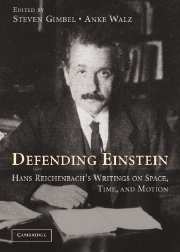Book contents
- Frontmatter
- Contents
- Introduction
- 1 Review of Moritz Schlick's General Theory of Knowledge
- 2 Einstein's Theory of Space
- 3 Reply to H. Dingler's Critique of the Theory of Relativity
- 4 A Report on an Axiomatization of Einstein's Theory of Space-Time
- 5 Reply to Th. Wulf's Objections to the General Theory of Relativity
- 6 Einstein's Theory of Motion
- 7 The Theory of Relativity and Absolute Transport Time
- 8 Reply to Anderson's Objections to the General Theory of Relativity
- 9 Review of Aloys Müller's The Philosophical Problems with Einstein's Theory of Relativity
- 10 The Philosophical Significance of the Theory of Relativity
- 11 Planet Clocks and Einsteinian Simultaneity
- 12 On the Physical Consequences of the Axiomatization of Relativity
- 13 Has the Theory of Relativity Been Refuted?
- 14 Response to a Publication of Mr. Hj. Mellin
- Index
12 - On the Physical Consequences of the Axiomatization of Relativity
Published online by Cambridge University Press: 09 November 2009
- Frontmatter
- Contents
- Introduction
- 1 Review of Moritz Schlick's General Theory of Knowledge
- 2 Einstein's Theory of Space
- 3 Reply to H. Dingler's Critique of the Theory of Relativity
- 4 A Report on an Axiomatization of Einstein's Theory of Space-Time
- 5 Reply to Th. Wulf's Objections to the General Theory of Relativity
- 6 Einstein's Theory of Motion
- 7 The Theory of Relativity and Absolute Transport Time
- 8 Reply to Anderson's Objections to the General Theory of Relativity
- 9 Review of Aloys Müller's The Philosophical Problems with Einstein's Theory of Relativity
- 10 The Philosophical Significance of the Theory of Relativity
- 11 Planet Clocks and Einsteinian Simultaneity
- 12 On the Physical Consequences of the Axiomatization of Relativity
- 13 Has the Theory of Relativity Been Refuted?
- 14 Response to a Publication of Mr. Hj. Mellin
- Index
Summary
I. What are the actual physical statements of the theory of relativity, aside from the general theoretical view? II. Response to some objections. III. The experimentally unconfirmed assumptions of Einstein's space-time theory. IV. Lorentz contraction, Einstein contraction, and their confusion.
Having already given a comprehensive account of an axiomatization of the theory of relativity, I would now like to expand upon those consequences which are especially important for physics. While this was originally intended to be a work of epistemology, and its real significance is primarily in that field, it does, however, provide some important results for the experimental foundation of the theory of relativity.
There are two approaches to physical axiomatization. In formulating a deductive axiomatization, the most general principle possible, perhaps a variational principle, is placed at the top and all other details are derived from it; only these derived details are testable, and if they are verified we may consider the abstract axiom to be more or less probable. Constructive axiomatization, on the other hand, proceeds differently. Here we take as axioms only those statements that are themselves direct experimental results; from them we derive the entire theory by integrating some additional conceptual elements, viz., definitions. The definitions are arbitrary and therefore can never introduce error into the theory. This form of axiomatization has the great advantage for physics that the implications of each experimental result can be immediately recognized.
- Type
- Chapter
- Information
- Defending EinsteinHans Reichenbach's Writings on Space, Time and Motion, pp. 171 - 194Publisher: Cambridge University PressPrint publication year: 2006



